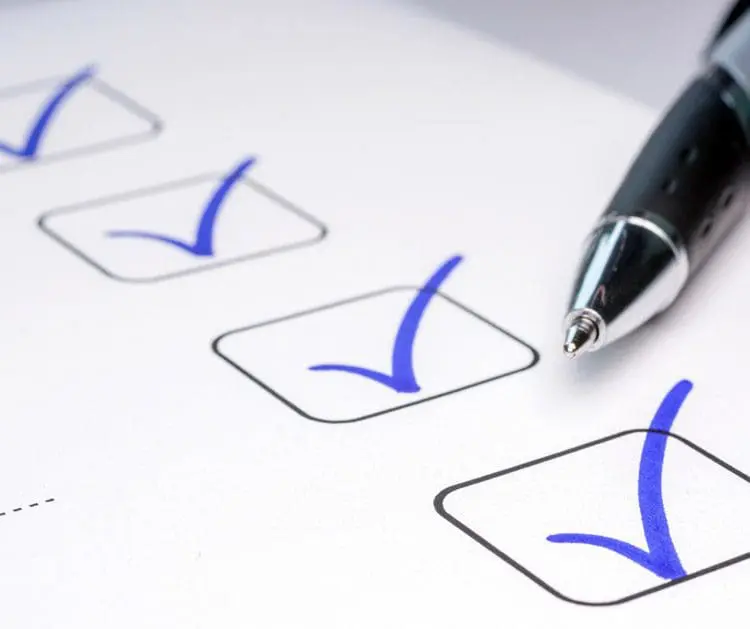
How to make sure you don't forget anything important
Is the deadline for your research paper or thesis getting closer and closer? In an ideal world you’d already be finished with your work and have ample time to make your last checks before printing out the final version. That’s at least how I always imagined that the last week before handing in my Master’s thesis would be.
In reality I ended up pulling a few all-nighters the last few days before my deadline. I assume I’m not the only one. For many of us, as a deadline draws near, every minute counts. When you’re stressed and crunched for time, it can be helpful to have a checklist to make sure you don’t accidentally forget any of the important formal requirements for your paper. We’ve prepared one for you that you can download here.
If you’re still in the early stages of your work, we suggest taking a few minutes to read through our list of steps to take before, during, and after your last rounds of checks. Your future self will thank you!
Please note: since the Citavi Word Add-In is used in Microsoft Word we’ve linked the guides for Word below.
Before your final check
Changes to the content of your work
Before beginning your final check, you should have already completed any changes to the content of your work. Read through your text multiple times and ask others to read it as well. You might even consider working with a paid copyeditor if your university allows it. After receiving feedback, incorporate changes into your text and finalize your wording. Your intellectual work is now finished.
Proofreading
As a next step, you should check your work for typos by using the Spelling & Grammar check in Word. Look over all of your punctuation as well, and don’t forget to delete any extra spaces by using the Find and Replace feature.
Bibliography and citation formatting
If you’re not working with a reference management program, you will need to carefully examine all of your bibliography entries and your in-text citations or footnotes. If you’re working with Citavi or another reference management program, you can skip this step. As long as you were careful when entering your sources and double-checked information for imported references., your references should be formatted correctly. However, you still should give your bibliography and citations a quick check, just in case a source was entered with a typo or in case the citation style rules are not up-to-date and don’t match the current style guidelines. If this ever happens or if you find another possible mistake, Contact the Citavi Team so that they can fix the style.
Hyphenation
If your citation style or paper guidelines require you to use hyphenation at the end of lines of text, you should enable the automatic hyphenation in Word. This feature works along with any fields inserted by your reference management program and will automatically update after you make any changes to those fields. Since the automatic hyphenation feature doesn’t always separate words as you might expect or want, you should double check all of the results. To avoid a strange result, you can use the keyboard combination Shift + Return to bring the word into the next line. The better solution is to omit the word from the automatic hyphenation. To do this, select the word by double-clicking it and then click the current language in the status bar in Word. Select the option “Do not check spelling or grammar”.
If you don’t want to use the automatic hyphenation feature at all, you can turn off this option and do it manually. Manual hyphenation makes sense if you are working with a lot of specialized academic terminology. Before manually hyphenating, we recommend converting all inserted citations to text in case you also want to use hyphenation in your citations or bibliography. If you don’t do this, your manual changes will disappear the next time your document is refreshed.
After you’ve finished these tasks, you can move on to your final checks:
During your final check
Cover page
Your cover page is the first thing your professor or thesis committee will see, so make sure that it makes a good impression. Double check that all the formatting matches the guidelines you were given and make sure that you haven’t left any information out, such as the course name, the name of your advisor, or the date. If you’ve been working on a longer-term project, such as a Master’s thesis, check if the formal requirements might have changed since you started. Also, make sure that the cover page does not include page numbers, which you can do by disabling starting the page numbering after the cover page.
Abstract
You likely won’t need an abstract for shorter undergraduate research papers, but if you need to provide one for a master’s thesis, check your guidelines. If you want additional tips for how to write an abstract, this guide from the George Mason University Writing Center can help.
Signed Declarations
Although not as common in the United States, some universities may require you to provide a signed declaration stating that your work is your own. Check if this is the case, and make sure to print out the form and then actually sign it before handing in your work.
Layout
Double-check the layout requirements in the guidelines from your course or university if you were not provided with a Word template. This can be a pain, but you don’t want to get points taken off for details such as line spacing, font size or page margins.
Table of contents
You don’t have to worry about manually adding page numbers to your table of contents if you die let Word create your table of contents for you. You can even do this at the very end even if you haven’t yet used the feature.
However, you should still check if the page breaks are still correct, for example, to make sure that the heading appears at the top of the next page rather than as the last line on a page. When you’re done, you can update the table of contents for the last time. If you don’t want your bibliography to have a number in front of it in the table of contents, watch our video to see how to remove it.
Don’t forget to check the other front and end matter in your work. For example, if you have an figure index, you’ll want to check if the figure numbering matches the numbering in the index. You will also want to update the fields in your table of figures one last time.
Save your Word document in the right format
For most undergraduate papers, you will simply hand in a Word document. If you’re submitting a thesis, however, you will often need to submit a printed copy. If you’re creating the printed version by sending it to a copy shop or an online printing service, make sure to create a PDF version of your Word document to ensure that your formatting stays exactly where you want it.
After your final check
Additional materials
Some universities may require you to submit both a paper and digital version of your work. In Germany, for example, many departments still require a digital version to be handed in on a CD or USB flash drive. Check your requirements to see if you need to do this.
Handing it in
Give yourself enough time before your deadline to make sure you have everything and aren’t rushed as you go to turn in your paper or thesis. If using a digital method, be very careful to start your upload early enough and have a backup plan in place in case your internet suddenly stops working.
Have you checked off everything on the list for your final check? Great – just don’t forget one last thing: to celebrate!
Your paper or thesis is now complete. What once seemed like an impossible project is now finally finished.
Since you checked off everything on the checklist, you can be sure that you thought of everything. Relax with a cup of tea, throw a (virtual) party or reward yourself in another way for your achievement. You’ve earned it!
Did you ever forget something important when handing in a paper or thesis? Are there any points we left out? And how did you celebrate the end of your research paper or thesis? We’d love to hear from you on Facebook or by email to bl**@****vi.com.
About Jana Behrendt

Jana Behrendt, a librarian by training, is deeply interested in everything related to personal information management. However, she does not read as much as you would expect from a librarian. She loves hiking in the Swiss Alps – as long as she doesn’t have to look down.
